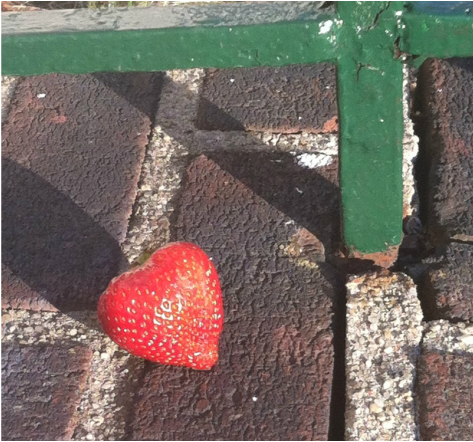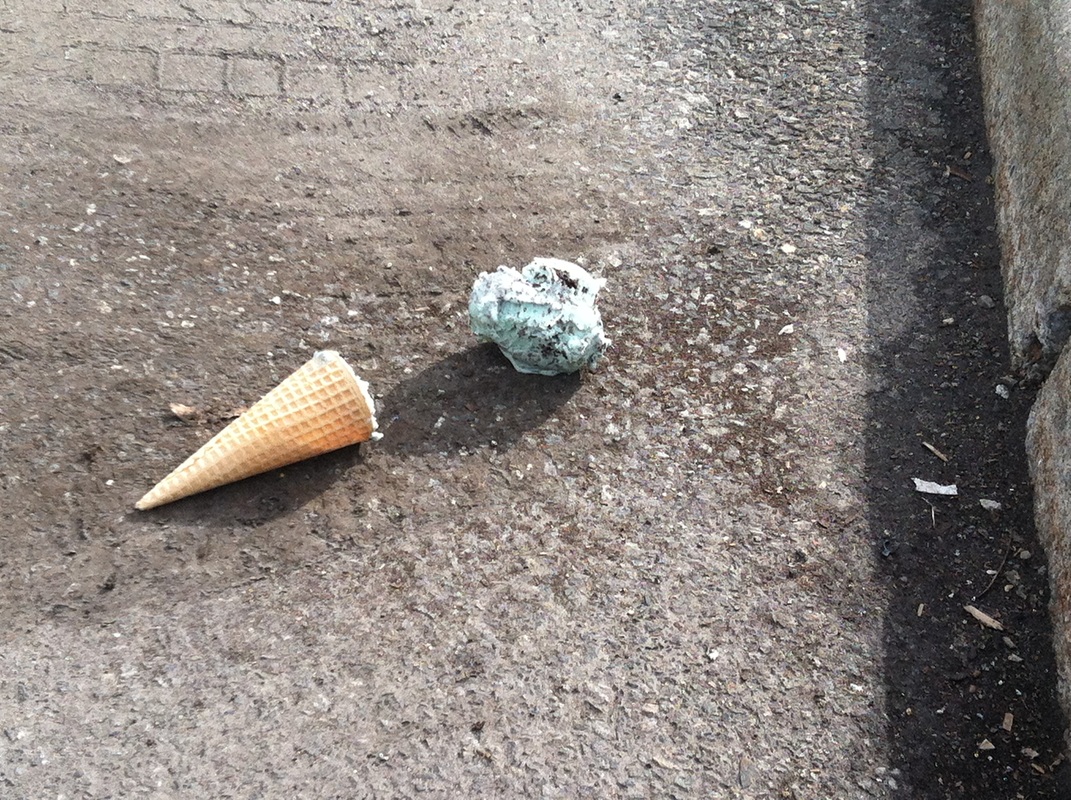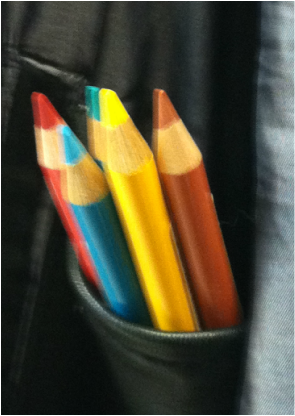My story "Split" owes its existence entirely to these various conversations with these two sisters--even if the fate of the story's protagonist turns out to be entirely different from theirs. And not only his fate: although his life and theirs overlap when it comes to certain external details, no resemblance of any other kind exists between him and that wonderful pair.
I
He had an apartment, a job. A life, of a sort.
Nothing was missing. Nothing obvious.
But he had to leave.
Every day, his studio seemed smaller. His bed, his kitchen, which he never used, his paycheck--everything was shrinking. New York was (impossibly) shrinking. He had to leave--if for no other reason than the key, the key that hung from a silver chain around his neck.
Luka lived on the East Side, high up in the nineties. He worked in a lab at the university, investigating--it always embarrassed him, it sounded like such a cliché--rat brains. Injecting inhibitors, modifying memory. Wondering what, in rats, might be human, and what in humans could be predicted from rats.
Sometimes, on the weekend, he went to see his parents in New Jersey. Other weekends, he went out with girls whom he met through friends at the lab. Or colleagues, at least. He wasn't sure whether he really felt that they were friends. He wasn't sure that he wanted them to be friends.
He just wanted to leave. He had to leave. He had to split.
Luka had been living in New York for fourteen years. In Queens. In Manhattan. For a year, after college, in Jersey. He’d come over with his parents, when things had gotten difficult back home, across the Atlantic. At first, expecting to go back. Then getting used to things, forgetting about going back, becoming someone else. Someone who, mostly, belonged here.
Almost half his life, he'd been a New Yorker. Gone to high school, college, had his second, his third, girlfriend. His first, his second job.
Every bit of clothing he wore, every pair of jeans and colored tee, was American, down to the last, Taiwanese stitch. And underneath his shirts, he always wore that very un-American, that heavy, awkward key, around his neck, on its silver chain.
How he'd ended up with it, he wasn’t sure. He didn’t know why his father didn’t have it, or his mother. He didn’t know why he was the only one who wanted to carry it around, the key that used to open that ancient, absurdly thick door, to the apartment in Dubrovnik. Before the apartment was destroyed, a week after they left.
The key made him think of his old bedroom, that he shared with his brother, made him think of the window in the living room, that looked out on the port, and of the roof, where he used to go with his first girlfriend, where he used to kiss her. The way fifteen-year-old boys kiss.
When he took it off, pulled it over his head on its chain, tossed it on top of the colored tee he'd just taken off, when he was about to make love to a woman … it made him feel guilty.
Almost as guilty as if he'd kept it on.
Split is a city of nearly 200,000, metropolitan area 400,000, on the Adriatic coast of Croatia. It is four hours north of the smaller Dubrovnik, where Luka had tried and failed to find a position. In Split, he found a job running a lab, doing very much the kind of work he'd done in New York, but for better pay, thanks to a government grant. He found an apartment, fell into the rhythm of the city, grew acclimated, re-acclimated, to the European lifestyle. When he left the sterile lab, he was greeted by the sound of children playing by the water, by scents of sea and pine and citrus. At night, crickets chirped at him through his shutters.
Sometimes, on the weekend, he travelled down the coast to Dubrovnik. His whole family had once lived there, until the war. His grandmother still did, in an apartment just on the water, with salt-specked shutters. But she wasn't the only reason he went. A month before handing in his resignation in New York, he had met a Dubrovnik girl. She was in America visiting relatives. She had a ready laugh, a lively nasal voice. She was pretty, blonde, and in less than half an hour she had won him over. She was not the least of the reasons he had handed in his resignation.
Every weekend, Luka travelled to see Jasna. Unless Jasna travelled to see Luka. Every other month, Jasna also took a week off from work, and stayed in Split, at Luka's place. They passed their time together sailing, walking, going to the movies, watching T.V. On Sundays, they ate lunch at Luka’s grandmother’s, or with Jasna’s family. They didn't talk about Luka's work, or Jasna's work. They didn't talk about why he had left New York.
It was on a Saturday morning, a sunny spring morning, just after Luka had arrived in Dubrovnik by bus to visit Jasna, that he saw Jágoda. They were coming in opposite directions down a busy sidewalk near the station. They caught eyes. They stopped, both of them, in surprise. Said hello.
For a minute, two minutes, they talked, as if in a capsule. As if they were alone on the sidewalk. While people struggled to go around them them, busy, annoyed, hurrying to and from the station. After two minutes, Luka asked Jágoda if she'd like to talk for longer. Jágoda said she would.
In Croatian, Jágoda means Strawberry. Fifteen years ago, when Luka used to go out with her, when he used to kiss her, up on the roof of his apartment building, it had been an apt name. Her hair was red then, her complexion pinkish. There was a softness about her--a softness in her voice, in her manner. And a sweetness. Strawberry.
Now, her hair was darker, her skin duskier. There was a ring on her finger, Luka noticed, as they turned toward a café they both knew. He had already heard that she had gotten married.
When they arrived at the café, there was only one open table that had room for her wheelchair. It was outside, next to a stone wall covered in pink flowers that grew from a vine. Luka and Jágoda sat in the spring morning air, drinking coffee, talking about old times, about other people, themselves. Each other.
What struck him was how strong she was. Beautifully strong. That was what struck him. She was nothing like a strawberry, anymore. He found himself searching in her words for a meaning beyond anything that could reasonably be expected to have been found there.
Then they exchanged phone numbers, and parted.
But why was he so late?
He shrugged a second time.
She had asked him three or four times, when he told her. Which led to the next question: Who was this Jágoda?
Again, he shrugged.
Who?
An old girlfriend.
How old?
Old. And married. Shall we go out? His turn to ask a question.
No.
Come on.
No.
Seeing how things stood, Luka turned the T.V. on to a soccer match, and waited. After an hour, Jasna came over, blocked the T.V. set., smiled. "Luka, why don't you call up that girl and her husband, and see if they want to go out?"
He made a face.
"But why not?"
He shrugged.
She had asked him three or four times, when he picked up the phone. "Hello, Jágoda? Luka here …"
Still, the rest of the weekend, Jasna was difficult. On the phone all week, too, she was difficult. And up until Saturday night, when the two couples went out. Then she was in fine spirits. At the restaurant, the women did most of the talking, getting along perfectly, which made Luka nervous. He and the husband stayed quiet.
On the way home, he and Jasna walked along the harbor. The air smelled of fish. The crickets, together with the surf, made it sound as if the city was snoring. Jasna’s spirits were finer than ever. Just before they got back, she laughed.
"What?" asked Luka.
"Oh, nothing."
"Hmm."
They walked a few steps.
"So why is she in a wheelchair?"
He stopped walking. "Schrapnel."
"Oh." She took his hand, bit playfully on his knuckle.
They walked a little further.
"Listen, Jasna," Luka said. "I have to go back a little earlier tomorrow."
When he returned the next afternoon to his apartment in Split, Luka found himself at loose ends. He made an omelette, watched T.V. He went and sat by the large window in his bedroom. An unfriendly row of agave cactus stretched along the sidewalk below.
As he sat, his hand found the back of his neck. He pulled at the chain there, once, twice. Then he lifted it, with its key, around, in front of his face, off of his neck.
He held it in his hands for a long time.
Then he put it back on.
The first Saturday after he bought it, he drove to Dubrovnik, enjoying the twists and turns of the road, the clear view of the sea. When he arrived, he called Jasna, who came down from her apartment.
"Now that you own something big, like a car, you're really back for good," she said, happily. Luka grunted.
He wasn't sure he had the money for a car. He might not even have a job. In a few weeks, the year-long grant funding his lab in Split would run out. He hadn’t heard yet whether it would be renewed.
Which might be a good thing. Work in Croatia hadn't turned out to be much different from what it had been in New York. He didn't much like his coworkers at the lab. They didn't listen to him, though he was the one who went to school in America, and was supposed to be the one in charge. Meanwhile, every time he talked to his parents, they asked when he was returning to New York. His brother, too.
At the same time, Jasna was beginning to get on his nerves. She wanted to talk about the future all the time now. She kept asking when he was moving to Dubrovnik.
That was when he got an offer from a company in Germany to run one of their labs.
Hearing the offer on the phone, he pumped his fist in the air.
It was just … the whole country seemed so … provincial now, after he’d been back for a whole year. His coworkers. Jasna. This idiotic superstition about unhealthy drafts, that kept people from using their air conditioners. If it weren't for his grandmother …
Then, as quickly, he became confused. He asked the Germans to give him some time to make his decision. He felt ...
When they called a second time, he couldn't talk. He was in Dubrovnik, with Jasna. She was annoying him, complaining of feeling sick all through his visit.
He hadn't told her about the offer from Germany.
He had told Jágoda though. He’d talked to her again, more than once, on the phone. He’d tried to see her, too, without Jasna, without her husband.
The first time he asked, she said she was busy.
The second time, she hesitated, then said the same thing.
Finally, the fifth time, when she heard his voice over the phone, she just said, "Look, why don't you stop calling?"
But he didn't want to stop. He wanted to talk to her again. And again.
It was funny. It wasn't that he had thought of her that often, when he was living in New York. Maybe just … somewhere, in the back of his mind.
They had never said goodbye properly, that was the problem. Unless it was just that he had never apologized properly. He had never really apologized at all. He hadn't had a chance.
Poor Jágoda was smarter than he was. She hadn't wanted to go up on the roof that night. She'd begged him not to go. Everybody said it was dangerous, being in a place like that.
He didn't care. He wanted to go. He wanted to kiss her, up there, in the middle of all the danger. It would be too perfect. He didn't believe anything could hurt them. He didn't believe it.
And he hadn't meant, after that first, faraway explosion happened, to be so much quicker than her. It was just that the view from the neighboring roof was so much better. And the view from the next building on, better still. He was meters ahead of her, when the second explosion occurred.
The next day, when his father decided that, if the building next to theirs had been hit, they'd better leave at once, she was still in the hospital. Still in the hospital, still unconscious.
And he was fine.
He asked the Germans if he could call them back in an hour. Tried the grant people again, without success. Left a second message. Started jingling the key and its chain, which he now found in his hand.
It was simple, really.
Either he put the chain away in a drawer now, and didn't take it out. Left it behind. Or he called Jágoda again. Simple.
Jingle.
It was stupid. She had told him not to call.
And what if she hadn't told him? Even then, wasn't it just something … empty, and dead?
Jingle.
But it could be something new, and alive. It could be. If--
The phone rang.
"Luka?"
It was Jasna.
"What's up?" he answered. "You sound--"
"I thought you would be wondering, because I was wondering, you know, since I was nauseated."
"Hmm?"
"So I decided to take a pregnancy test--"
"What?"
"Yeah, and so I took it just now, and--"
“And?”
"And--"
His chest itched, too. It itched on that spot where it always itched. And he was tired. He'd been working all day.
He was working again now, after rushing through dinner. It was something extra, something he’d brought home from the lab. As always, the Germans were pushing him, pushing him.
He squinted at the screen, turned to look over his shoulder at the rest of the apartment. The boy was playing a video game, loudly, on the T.V. The girl was crying, Jasna was shouting at both of them to keep it down. He put his fingers in his ears, to help him concentrate.
He was relieved when the phone rang. “Hello?”
But he couldn't hear any reply.
“Wait a minute, all right?”
Something incomprehensible came back at him.
Luka walked through the apartment. He walked past the children, past all the noise. He held up the phone toward Jasna in explanation, opened the door, went outside, into the winter air.
“All right, sorry. Hello?”
Snow was falling.
“Luka? Jágoda.”
“Jágoda!”
The wind blew into Luka’s face.
“Jágoda. How in the world are you?”
“I'm … all right. And you?”
“I’m fine.”
“Good,” said Jágoda. “I'm fine, too.”
“Good.”
There was a pause. Or at least, Luka didn’t hear anything. The falling snow seemed to muffle the connection to wherever Jágoda was calling from. Just as it muffled the sounds outside, and blurred the lights of the cold, northern city.
Then the sound returned: “Luka, are you there?”
“Yes.”
“Listen,” she said. “I’ve just gotten divorced--”



 RSS Feed
RSS Feed